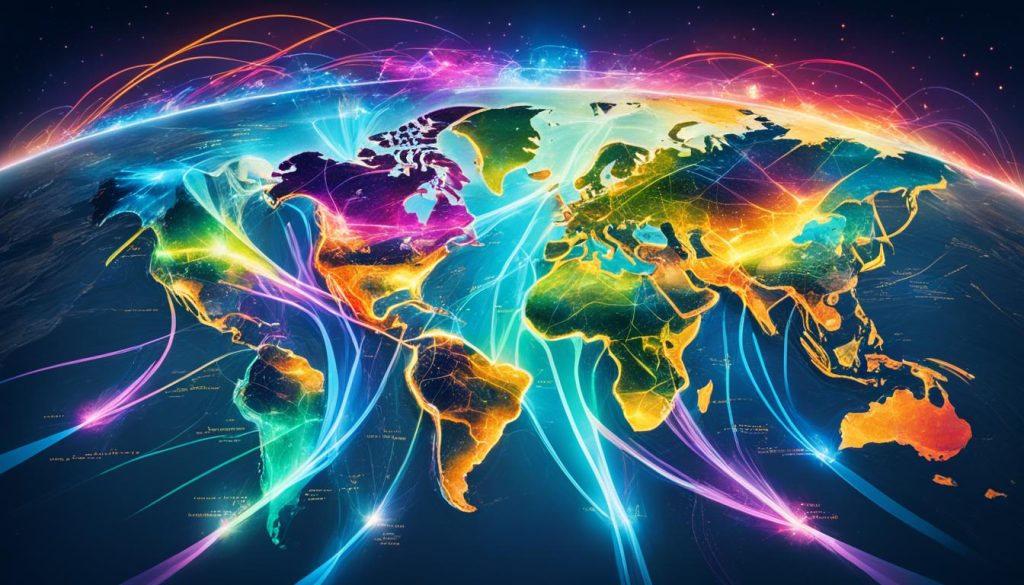Recently, the world has seen big changes because of global trends. The COVID-19 pandemic has changed how businesses and customers act. Now, they deal with the impacts, which affect markets and how people behave. These changes, along with economy, politics, and society, are shaping a new scene. In this scene, it’s key to handle disruptions and transform businesses.
For businesses aiming for the future, using new technology is key. The right tech helps businesses change and grow. This ensures they’re ready for future problems and chances.
Key Takeaways
- Global macrotrends have a significant impact on business and consumer landscapes.
- The COVID-19 pandemic continues to influence market insights and consumer behaviour.
- Understanding economic, political, and social factors is crucial for managing disruption.
- Technological innovation is essential for driving business transformation and future readiness.
- Businesses must unlock a broader perspective to prepare for future shifts confidently.
Understanding Global Consumer Behaviour
In recent times, brands must understand consumer behaviour. The COVID-19 pandemic changed buying habits and priorities. It’s vital for businesses to focus on consumer insights to keep up with the changing market.
Various factors affect these changes. Economic instability and political unrest are key influencers.
Impact of the COVID-19 Pandemic
The COVID-19 pandemic changed how markets operate. People now look for essential goods and value. They buy less of what they don’t need. Businesses must adjust to these changes to meet new consumer needs.
Lockdowns and health worries made online shopping more popular. This makes digital channels important for reaching customers.
Economic Instability and Consumer Reactions
Economic trends significantly influence consumer behaviour. With economic instability, people spend less on extra items. They focus on essentials. Brands need to understand these trends to adapt their strategies.
By analysing market behaviour, businesses can find new opportunities. They can meet consumer needs even when the economy is uncertain.
Political Unrest and Its Influence on Spending
Political unrest affects consumer confidence, impacting spending. In these situations, people are more careful with their purchases. They look for safety and security.
Businesses must be aware of political changes. This helps them anticipate market shifts and keep consumer trust.
Understanding these critical factors helps businesses grasp global consumer behaviour. Knowing about pandemic impacts, economic uncertainty, and political unrest allows them to adapt. This way, they can succeed in a changing market.
Global Smart Mobility Innovations
Smart mobility is changing how we travel. It brings together new technology to make moving around more efficient, green, and easy. We’re starting to see exciting new ways to get from A to B.
Technological Advances in Transportation
Transport technology has improved a lot lately. Now, we have electric vehicles and AI in buses and trains. Big car companies like Tesla and BMW are making electric cars. These cars are better for the planet and still drive great.
Redefining Possibilities with Smart Mobility
Smart mobility is making personal and public transport better. We’ve got self-driving buses, car share services, and traffic systems that work in real-time. These changes help to cut down traffic, pollution, and make roads safer for everyone.
Thanks to smart mobility, we’re on the brink of a big change in how we travel. This will be great for people and the earth alike.
A C-suite Guide to Digital Trust Insights

In our digital world, gaining digital trust is key for businesses to truly transform. It is crucial for C-suite leaders to make cyber readiness simple to protect their firms from growing cyber threats. Making digital trust a priority is the core of modern business, helping firms cope with the digital world’s challenges.
Simplifying Cyber Readiness
Being cyber ready means more than just having strong security. It’s about creating a culture of alertness in the firm. The C-suite must lead, pushing for full cyber security strategies. These include regular training, checking systems, and having a plan for when things go wrong. By making these steps simpler, leaders can better defend their organization and strengthen its digital backbone.
The Role of Digital Trust in Business Transformation
Digital trust is central to C-suite strategies for changing their businesses. Trust in the digital space boosts customer confidence and builds lasting bonds. This leads to growth and new ideas. To keep and build on this trust, firms must focus on being clear, keeping data safe, and having strong cyber protections. Building digital trust is crucial for firms to stay ahead and meet their clients’ changing needs in the digital space.
Accelerating the Energy Transition to Net Zero
The drive to combat climate change through the energy transition is key. Aiming for net zero commitments by 2030 shows a firm’s serious resolve to lower its footprint. They are adopting bold policies and enhancing partnerships for this purpose. Let’s explore the path to net zero together.
Commitments to Net Zero by 2030
Making early moves is vital for firms eyeing net zero commitments by 2030. Giants like Siemens and Unilever have pledged to these goals, leading the charge for a greener tomorrow. Meeting these goals necessitates big changes and a strong commitment to cut down carbon levels.
Strategies to Achieve Net Zero Greenhouse Gas Emissions
To reduce greenhouse gases effectively, companies need a thorough plan. They can:
- Swap fossil fuels for renewable energy sources.
- Boost energy efficiency in all their processes.
- Adopt tech for capturing and storing carbon.
- Work together across industries to share and innovate.
By taking these steps, organisations can speed up the energy transition. This will help them make big leaps toward their net zero commitments.
Four Urgent Global Crises and Their Solutions
Addressing urgent global crises needs many different actions. We must work together for effective, lasting solutions.
Climate Change Mitigation
We must act now to fight climate change. This means cutting carbon emissions, using renewable energy, and adopting green technology. Everyone must do their part to truly make a difference.
Addressing Poverty and Inequality
Fighting poverty and inequality is key to a stable world. We need policies for equal chances, fair pay, education, and healthcare access. By growing the economy in a way that includes everyone, we can close the wealth gap.
Technological Disruption and Opportunities

Technology is changing fast, changing how industries work worldwide. It brings both problems and chances. To stay ahead, businesses need to adapt and innovate.
AI Adoption Amidst Crisis
AI has grown quickly during recent tough times. It has brought new ways to solve problems, changing many fields. Companies like Google and IBM use AI to work better and bring new ideas. This shift in technology is changing old business ways, leading to a future focused on data and smart decisions.
Blockchain’s Impact on Business
Blockchain is starting to make a big difference, changing how we see trust and efficiency. It’s safe and open, making online deals more trustworthy. For example, IBM is creating blockchain solutions that make supply chains better. As more companies try new things, blockchain will change technology even more, opening doors for innovation.
Global Talent Trends Shaping the Workforce
The world of work is changing fast, thanks to new technology and AI. Businesses around the globe are updating how they grow their teams. They are using new tech to make work better for everyone. This change helps them stay strong and keep their team happy after the pandemic.
Advancements in Work Design and AI
Using AI in HR is a big trend right now. It makes work faster and helps find and keep great people. With AI, companies can make a workplace that changes as needed. This meets today’s job needs perfectly.
Promoting Equity and Inclusion
Being fair and including everyone is key for companies today. This approach sparks new ideas and keeps employees happy and loyal. To do this, businesses are setting up rules and programs. They make sure everyone gets the same chances, which is crucial for team growth these days.
To stay ahead, companies must follow these new trends closely. They aim to build a team that’s diverse, tech-savvy, and able to adapt.
Broader Perspective on Global Trends
Today’s global market is complex. It’s vital to understand how changes in specific sectors link to broader economic trends. Technological progress is key, influencing both immediate plans and future goals.
To stay ahead, firms must grasp emerging consumer trends. These trends drive market demands and operational plans. By observing these changes, companies can find strategic advantages through technology.
A deep dive into global trends also means getting to grips with big economic factors. Changes in economic policies and indicators can greatly affect industries. So, businesses need to blend these economic insights into their strategies. This fosters strength and flexibility.
In the end, having the right tools is crucial for companies facing these complex issues. Advances in analytics and data reading help firms make sense of difficult trends. This leads to quicker, savvier choices.
Focus on Sustainability and Consumer Priorities

Today, more than ever, companies are focusing on being green. Modern shoppers want to live in a way that helps the planet. They expect companies to offer products that are kind to the earth. Making sustainable choices easy for everyone is a big challenge for businesses.
New Green Reality
Our world is changing towards more eco-friendly habits. This means companies are working hard to lower how much they harm the environment. They’re changing how they make things and choosing materials that don’t hurt the earth. This change matches what customers now expect from them.
Integrating Sustainability into Daily Life
It’s important to make being eco-friendly a normal part of our day. Companies can help by offering products and services that make it easier to choose green. This means they need to keep coming up with new ideas, be open about what they do, and talk with their customers.
The Emergence of Relationship Renaissance
In the digital age, we’re seeing a big shift called the relationship renaissance. It’s about craving real human connections and deeper intimacy. Digital media is changing how we form these bonds. It makes people and brands rethink their interactions.
Impact of Digital Media on Human Connections
Digital media is everywhere, changing how we talk and connect. Sites like Instagram and Facebook make it easy to keep in touch, even from far away. But, this can also lead to less meaningful interactions. More people are realizing the need for true connection amidst digital chatter.
Seeking New Forms of Intimacy
During this time, folks are trying new ways to be close. Video chats and online meet-ups are now normal for socialising. These methods show how our view of closeness is changing. Emotional bonds remain key. Brands are getting this and adding personal touches to their tech, keeping our human connections strong.
The Essential Eight Technologies
In today’s fast-changing digital world, it is vital to stay ahead. Knowing and using important technologies can transform businesses. These eight technologies are key for anyone looking to keep their business competitive.
Emerging Technologies for Business Innovation
Eight technologies are changing business innovation. Artificial intelligence (AI) and machine learning improve decision-making. Internet of Things (IoT) devices help in running operations smoothly by providing updates in real-time.
Blockchain is making transactions safer and more transparent. Augmented reality (AR) and virtual reality (VR) are changing how customers experience services and staff training.
Quantum computing is solving difficult problems faster than ever. Edge computing processes data quickly by working closer to where it’s collected. The introduction of 5G technology improves connection speeds, pushing further technological advancements in business.
- Artificial Intelligence (AI)
- Machine Learning
- Internet of Things (IoT)
- Blockchain Technology
- Augmented Reality (AR)
- Virtual Reality (VR)
- Quantum Computing
- 5G Technology
Companies must mix these critical technologies into their operations to fully benefit from them. With an increasing need for new solutions, adapting and using these technologies is key for continued success.
Positive Perspectives Amidst Uncertainty

In today’s ever-changing market, staying positive is key to overcoming challenges. Working together, brands and consumers help steady the market. They push for changes that make things better, improving how they connect and building a strong base for what’s coming.
Brand and Consumer Collaboration for Stability
The link between brands and their customers is at the core of staying upbeat. This relationship is vital for a stable market. As companies work closer with their buyers, sharing thoughts and feedback becomes crucial. This teamwork sparks innovation and builds trust, which is vital when times are tough.
- Engaging consumers in product development
- Building trust through transparent communication
- Fostering loyalty with personalised experiences
Working together like this leads to a market where everyone wins. By focusing on what customers want, brands can offer better, more relevant products.
This cooperation strengthens the market, helping it grow even in hard times. It lights the way to a hopeful future.
Podcast Insights: Take on Tomorrow
‘Take on Tomorrow’ is a special podcast series. It dives into future trends that will impact both businesses and consumers. The series covers key topics like data privacy and the financial changes brought by cryptocurrencies. It gives listeners deep insights and helpful advice.
Privacy and Consumer Data
In our digital world, keeping data safe is a big worry for everyone. The podcast ‘Take on Tomorrow’ looks deep into data privacy. It talks about ways to protect personal info and keep customer trust. Companies need to understand this to stay ahead as cyber threats grow.
Cryptocurrency’s Financial Revolution
The podcast also talks about how cryptocurrencies are changing finance. It looks at how digital currencies like Bitcoin and Ethereum are growing. ‘Take on Tomorrow’ shows the good and the bad of this change. Understanding these points helps businesses make the most of cryptocurrencies.
‘Take on Tomorrow’ gives a full view on important issues. It prepares businesses to face future challenges. It helps them tap into new chances in data privacy and cryptocurrency.
Pwc Alliances and Ecosystems
PwC’s alliances create a solid foundation that uses tech ecosystems for full digital change. These partnerships help companies stay leading by using new tech to get better at what they do and be more competitive.
Combining Expertise and Technology
PwC works with top tech companies to mix deep knowledge with the latest tech. This combo helps clients overcome tough challenges with new solutions within tech ecosystems. It’s a smooth mix of business smarts and tech progress.
Advancing Cloud Transformation
Cloud tech is key in PwC’s drive for digital change. These cloud solutions change how companies work, making things scalable, efficient, and safe. PwC’s cloud services help firms stay agile in a fast-changing digital world.
Strategies for Building Resilient Cultures
Building resilient business cultures is key in today’s fast-changing business world. Companies now see the importance of making environments where employees can handle risks and grow. They’re setting up strong workplace strategies to make sure the organisation can face future challenges.
Focusing on mental well-being is vital for a resilient culture. Companies are starting mental health days, support programmes, and talks on stress. This helps create a place where workers feel supported and can do their best, even when times are hard.
Being able to adapt is crucial for these cultures. Companies encourage learning, innovation, and being ready for change. These methods make organisations flexible and quick to tackle new problems. Embedding these ideas at work helps build a strong, lasting business culture.











